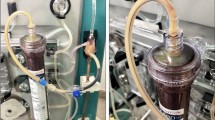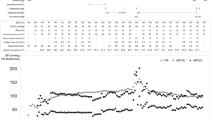Abstract
Background
Propofol infusion syndrome (PRIS) is well known, often associated with, lethal complication of sedation with propofol. PRIS seems to be associated with young age, traumatic brain injury (TBI), higher cumulative doses of propofol, and the concomitant use of catecholamines. Known manifestations of PRIS are metabolic acidosis, rhabdomyolysis, and cardiac failure. While fatal PRIS can occur suddenly and rapidly, there is no sensitive test or early warning sign, and the only preventive measure is to limit propofol dosage and its duration.
Methods: Description of a single case
A case report was used for investigation purposes of this study.
Results
We report the case study of a young patient with severe TBI, receiving propofol sedation because of high intracranial pressure. Seven days after the trauma, the patient developed metabolic acidosis and refractory circulatory shock, probably caused by PRIS. Reversal of T-waves was seen on the electrocardiogram (ECG) 29 h before circulation failure occurred. In the absence of other signs of cardiac dysfunction or ischemia, these reversed T-waves probably represent an early warning sign of developing PRIS.
Conclusion
From the findings of this study, we conclude that meticulous observation and analysis of the ECG during propofol sedation might result in earlier recognition of developing PRIS.


Similar content being viewed by others
References
Fong JJ, Sylvia L, Ruthazer R, Schumaker G, Kcomt M, Devlin JW. Predictors of mortality in patients with suspected propofol infusion syndrome. Crit Care Med. 2008;36(8):2281–7.
Parke TJ, Stevens JE, Rice AS, et al. Metabolic acidosis and fatal myocardial failure after propofol infusion in children: five case reports. BMJ. 1992;305(6854):613–6.
Bray RJ. Propofol infusion syndrome in children. Paediatr Anaesth. 1998;8(6):491–9.
Marinella MA. Lactic acidosis associated with propofol. Chest. 1996;109(1):292.
Perrier ND, Baerga-Varela Y, Murray MJ. Death related to propofol use in an adult patient. Crit Care Med. 2000;28(8):3071–4.
Cremer OL, Moons KG, Bouman EA, Kruijswijk JE, de Smet AM, Kalkman CJ. Long-term propofol infusion and cardiac failure in adult head-injured patients. Lancet. 2001;357(9250):117–8.
Otterspoor LC, Kalkman CJ, Cremer OL. Update on the propofol infusion syndrome in ICU management of patients with head injury. Curr Opin Anaesthesiol. 2008;21(5):544–51.
Brain Trauma Foundation; American Association of Neurological Surgeons; Congress of Neurological Surgeons; Joint Section on Neurotrauma and Critical Care, AANS/CNS, Bratton SL, Chestnut RM, Ghajar J, et al. Guidelines for the management of severe traumatic brain injury. XI. Anesthetics, analgesics, and sedatives. J Neurotrauma. 2007;24 Suppl 1:S71–6.
Roberts RJ, Barletta JF, Fong JJ, et al. Incidence of propofol-related infusion syndrome in critically ill adults: a prospective, multicenter study. Crit Care. 2009;13(5):R169.
Smith H, Sinson G, Varelas P. Vasopressors and propofol infusion syndrome in severe head trauma. Neurocrit Care. 2009;10(2):166–72.
Iyer VN, Hoel R, Rabinstein AA. Propofol infusion syndrome in patients with refractory status epilepticus: an 11-year clinical experience. Crit Care Med. 2009;37(12):3024–30.
Matta B, Menon D. Severe head injury in the United Kingdom and Ireland: a survey of practice and implications for management. Crit Care Med. 1996;24:1743–8.
Fudickar A, Bein B. Propofol infusion syndrome: update of clinical manifestation and pathophysiology. Minerva Anestesiol. 2009;75(5):339–44.
Kam PC, Cardone D. Propofol infusion syndrome. Anaesthesia. 2007;62(7):690–701.
Vernooy K, Delhaas T, Cremer OL, et al. Electrocardiographic changes predicting sudden death in propofol-related infusion syndrome. Heart Rhythm. 2006;3(2):131–7.
Brain Trauma Foundation; American Association of Neurological Surgeons; Congress of Neurological Surgeons; Joint Section on Neurotrauma and Critical Care, AANS/CNS, Bratton SL, Chestnut RM, Ghajar J, et al. Guidelines for the management of severe traumatic brain injury. VIII. Intracranial pressure thresholds. J Neurotrauma. 2007;24 Suppl 1:S55–8.
Alkire MT, Haier RJ, Barker SJ, Shah NK, Wu JC, Kao YJ. Cerebral metabolism during propofol anesthesia in humans studied with positron emission tomography. Anesthesiology. 1995;82(2):393–403.
Kelly DF, Goodale DB, Williams J, et al. Propofol in the treatment of moderate and severe head injury: a randomized, prospective double-blinded pilot trial. J Neurosurg. 1999;90(6):1042–52.
Johnston AJ, Steiner LA, Chatfield DA, et al. Effects of propofol on cerebral oxygenation and metabolism after head injury. Br J Anaesth. 2003;91(6):781–6.
Wong JM. Propofol infusion syndrome. Am J Ther. 2010;17(5):487–91.
Wolf A, Weir P, Segar P, Stone J, Shield J. Impaired fatty acid oxidation in propofol infusion syndrome. Lancet. 2001;357(9256):606–7.
Vasile B, Rasulo F, Candiani A, Latronico N. The pathophysiology of propofol infusion syndrome: a simple name for a complex syndrome. Intensive Care Med. 2003;29(9):1417–25.
Ahlen K, Buckley CJ, Goodale DB, Pulsford AH. The ‘propofol infusion syndrome’: the facts, their interpretation and implications for patient care. Eur J Anaesthesiol. 2006;23(12):990–8.
Davenport A. Management of acute kidney injury in neurotrauma. Hemodial Int. 2010;14(Suppl 1):S27–31.
Author information
Authors and Affiliations
Corresponding author
Rights and permissions
About this article
Cite this article
Mijzen, E.J., Jacobs, B., Aslan, A. et al. Propofol Infusion Syndrome Heralded by ECG Changes. Neurocrit Care 17, 260–264 (2012). https://doi.org/10.1007/s12028-012-9743-8
Published:
Issue Date:
DOI: https://doi.org/10.1007/s12028-012-9743-8




